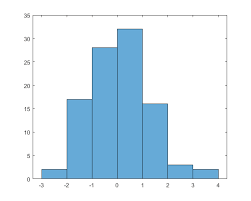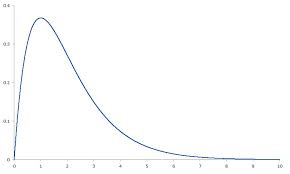Descriptive and Inferential Statistics
The paradigm characterized most by the notion that with enough research we can gain knowledge of a universal truth is
What is Positivism
A ______ is a construct that has at least two levels or categories, and, therefore, can vary
What is a variable
_______ research attempts to capture the relationship between two things that can be measured numerically
What is quantitative research
The picture is of what type of graph?

What is a histogram
_________ are any individuals involved in or affected by the program. These are individuals to whom the professional counselor is accountable and can include parents, family members, principals, teachers, administrators, clients, community leaders, funding agencies, and so forth.
What are stakeholders
The ________ study failed the most to outline participants’ voluntariness
What is the Willowbrook Study
The _______ is a statement that "There is no relationship between an IV and DV
What is a null hypothesis
______ attempts to answer questions about how a behavior or phenomenon occurs
What is qualitative research
What are the three measures of central tendency?
What is mean, median, and mode
During the needs assessment process, a(n) ________ is typically given to stakeholders.
What is an executive summary
The ________ was created in 1979, and holds researchers to researching ethically
What is the Belmont Report
This is the most common sampling methods, where counselors select easily accessible population
What is convenience sampling
______ is known as randomized experimental designs and are considered the gold standard for experimental designs
What is true experimental design
The skewness of this graph is?

Positively skewed
Determining if a program should be continued again is known as
What is an outcome evaluation
The ______ was a very shocking study, in order to investigate blind obedience
What is the Milgram obedience study
In a _______ neither the researcher nor the participants know what group they belong to
What is a double blind study
All of the following are characteristics of qualitative research EXCEPT
a. identifying researcher bias.
b. engaging in hypothesis testing.
c. managing and analyzing data throughout a qualitative study.
d. collaborating with participants and treating them as experts.
What is engaging in hypothesis testing
_______ involves more than one predictor variable; each predictor variable is weighted in a regression equation to determine the contribution of each variable to the criterion variable
What is multiple regression
__________ allows one to quantitaively decide on a particular course of action
What is a efficiency analysis (cost-benefit analysis)
In 2005 the _______ was created with a section dedicated to making counselors research ethically
What is the ACA Code of Ethics
Which of the following internal validity threats is LEAST likely related to a repeated measures study for a group of sixth-graders?
a. History
b. Maturation
c. Attrition
d. Diffusion of treatment
What is diffusion of treatment
Which of the following qualitative research traditions most assists the counselor to collaborate with participants to enact change in a setting?
a. Ethnography
b. Biography
c. Case study
d. Participatory action research
What is participatory action research
A professional counselor wants to examine the relationship between education level and the decision to participate in a continuing education program. What statistical test would likely be appropriate?
What is Chi-square
The 6th general step in program evaluation is
What is monitor and evaluate the programs progress